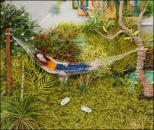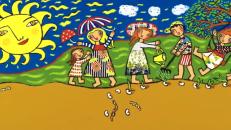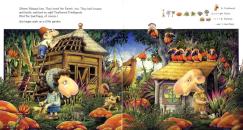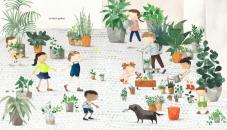
Latest Issues
AbstractHistoryArchive Description
'An alienating city street gradually becomes a place to call home. Little by little, baby Tracy grows. She and her neighbours begin to rescue their street. Together, children and adults plant grass and trees and bushes in the empty spaces. They paint murals over old graffiti. They stop the cars. Everything begins to blossom. Belonging explores the re-greening of the city: the role of community, the empowerment of people and the significance of children, family and neighbourhood in changing their urban environment. The streets gradually become places for safe children's play, and community activity and places for nature and wonder.'
(Source: Author's website, http://www.jeanniebaker.com/picture_books_index.htm)
Notes
-
Wordless picture book.
-
A companion book to Window.
-
This is affiliated with Dr Laurel Cohn's Picture Book Diet because it contains representations of food and/or food practices.
Food depiction - Incidental
Food types - Everyday foods
- Discretionary foods
- High sugar foods
- Processed foods
- Fresh foods
- Fast food/Takeaway
Food practices - Eating in - snack
- Parties and Entertaining
- Food production
Gender n/a Signage - Signs for real products
- Shop sign
- Logo [Coke, Pizza Hut]
Positive/negative value n/a Food as sense of place - Urban
Setting - Urban landscape
Food as social cohesion - Social gatherings
Food as cultural identity - White Australian characters
Food as character identity n/a Food as language n/a -
Other formats: Also large format
Affiliation Notes
-
This work is affiliated with the AustLit subset Asian-Australian Children's Literature and Publishing because it has been published in China.
Publication Details of Only Known VersionEarliest 2 Known Versions of
Works about this Work
-
Longing and Belonging in the Green Worlds of Jeannie Baker
2023
single work
criticism
— Appears in: Storying Plants in Australian Children's and Young Adult Literature : Roots and Winged Seeds 2023; (p. 75-87)'Jeannie Baker uses mixed materials, including real plants, to illustrate relationships between nature, humans and suburban and urban development in her textless collage picturebooks Window (1991) and Belonging (2004). These popular texts are read and studied in the classroom to raise environmental awareness and explore themes of sustainable development and community action. How can a reading of these two books through the lens of Indigenous writer and academic Ambelin Kwaymullina’s verse manifesto, Living on Stolen Land, reveal and disturb the mechanisms of settler-colonialism as they appear in Baker’s work? Placing these texts in juxtaposition with each other generates new understandings and new narrative possibilities.' (Publication abstract)
-
Jeannie Baker : Mirror,Mirror...
2013
single work
criticism
— Appears in: The Horn Book Magazine , May/June vol. 89 no. 3 2013; (p. 16-24) -
y
 Reading The Environment : Narrative Constructions Of Ecological Subjectivities In Australian Children's Literature
Kelvin Grove
:
2009
Z1792849
2009
single work
thesis
Ways in which humans engage with the environment have always provided a rich source of material for writers and illustrators of Australian children's literature. Currently, readers are confronted with a multiplicity of complex, competing and/or complementing networks of ideas, theories and emotions that provide narratives about human engagement with the environment at a particular historical moment. This study examines how a representative sample of Australian texts (19 picture books and 4 novels for children and young adults published between 1995 and 2006) constructs fictional ecological subjects in the texts, and offers readers ecological subject positions inscribed with contemporary environmental ideologies. The conceptual framework developed in this study identifies three ideologically grounded positions that humans may assume when engaging with the environment. None of these positions clearly exists independently of any other, nor are they internally homogeneous. Nevertheless they can be categorised as: (i) human dominion over the environment with little regard for environmental degradation (unrestrained anthropocentrism); (ii) human consideration for the environment driven by understandings that humans need the environment to survive (restrained anthropocentrism); and (iii) human deference towards the environment guided by understandings that humans are no more important than the environment (ecocentrism). iv The transdisciplinary methodological approach to textual analysis used in this thesis draws on ecocriticism, narrative theories, visual semiotics, ecofeminism and postcolonialism to discuss the difficulties and contradictions in the construction of the positions offered. Each chapter of textual analysis focuses on the construction of subjectivities in relation to one of the positions identified in the conceptual framework. According to the analysis undertaken, the focus texts convey the subtleties and complexities of human engagement with the environment and advocate ways of viewing and responding to contemporary unease about the environment. The study concludes that these ways of viewing and responding conform to and/or challenge dominant socio-cultural and political-economic opinions regarding the environment. This study, the first extended work of its kind, makes an original contribution to ecocritical study of Australian children's literature. By undertaking a comprehensive analysis of how texts for children represent human engagement with the environment at a time when important environmental concerns pose significant threats to human existence, Massey contributes new knowledge to an area of children's literature research that to date has been significantly under-represented.
Reading The Environment : Narrative Constructions Of Ecological Subjectivities In Australian Children's Literature
Kelvin Grove
:
2009
Z1792849
2009
single work
thesis
Ways in which humans engage with the environment have always provided a rich source of material for writers and illustrators of Australian children's literature. Currently, readers are confronted with a multiplicity of complex, competing and/or complementing networks of ideas, theories and emotions that provide narratives about human engagement with the environment at a particular historical moment. This study examines how a representative sample of Australian texts (19 picture books and 4 novels for children and young adults published between 1995 and 2006) constructs fictional ecological subjects in the texts, and offers readers ecological subject positions inscribed with contemporary environmental ideologies. The conceptual framework developed in this study identifies three ideologically grounded positions that humans may assume when engaging with the environment. None of these positions clearly exists independently of any other, nor are they internally homogeneous. Nevertheless they can be categorised as: (i) human dominion over the environment with little regard for environmental degradation (unrestrained anthropocentrism); (ii) human consideration for the environment driven by understandings that humans need the environment to survive (restrained anthropocentrism); and (iii) human deference towards the environment guided by understandings that humans are no more important than the environment (ecocentrism). iv The transdisciplinary methodological approach to textual analysis used in this thesis draws on ecocriticism, narrative theories, visual semiotics, ecofeminism and postcolonialism to discuss the difficulties and contradictions in the construction of the positions offered. Each chapter of textual analysis focuses on the construction of subjectivities in relation to one of the positions identified in the conceptual framework. According to the analysis undertaken, the focus texts convey the subtleties and complexities of human engagement with the environment and advocate ways of viewing and responding to contemporary unease about the environment. The study concludes that these ways of viewing and responding conform to and/or challenge dominant socio-cultural and political-economic opinions regarding the environment. This study, the first extended work of its kind, makes an original contribution to ecocritical study of Australian children's literature. By undertaking a comprehensive analysis of how texts for children represent human engagement with the environment at a time when important environmental concerns pose significant threats to human existence, Massey contributes new knowledge to an area of children's literature research that to date has been significantly under-represented.
-
y
 New World Orders in Contemporary Children's Literature : Utopian Transformations
Houndmills
:
Palgrave Macmillan
,
2008
Z1559477
2008
selected work
criticism
'New World Orders shows how texts for children and young people have responded to the cultural, economic, and political movements of the last 15 years. With a focus on international children's texts produced between 1988 and 2006, the authors discuss how utopian and dystopian tropes are pressed into service to project possible futures to child readers. The book considers what these texts have to say about globalisation, neocolonialism, environmental issues, pressures on families and communities, and the idea of the posthuman.' - Back cover.
New World Orders in Contemporary Children's Literature : Utopian Transformations
Houndmills
:
Palgrave Macmillan
,
2008
Z1559477
2008
selected work
criticism
'New World Orders shows how texts for children and young people have responded to the cultural, economic, and political movements of the last 15 years. With a focus on international children's texts produced between 1988 and 2006, the authors discuss how utopian and dystopian tropes are pressed into service to project possible futures to child readers. The book considers what these texts have to say about globalisation, neocolonialism, environmental issues, pressures on families and communities, and the idea of the posthuman.' - Back cover.
-
From Eden to Suburbia : Perspectives on the Natural World in Children's Literature
2006
single work
criticism
— Appears in: Papers : Explorations into Children's Literature , December vol. 16 no. 2 2006; (p. 40-45) Stephen's compares a number of children's texts, including Jeannie Baker's Window and Belonging, which focus on representations of the natural environment. Stephen's articulates three ideological perspectives which are the most common approaches to dealing with ecological issues in children's literature; the positioning of human subjectivity as outside of nature; the assumption that 'a represented landscape must include humans to perceive it and operate as a site of some kind of narrative'; and the representation of nature as 'endangered' and reliant upon human intervention and appropriate management (41). Stephens claims that overall, texts with an ecological message show a tendency to locate humans as both the cause of and solution to, ecological destruction, and texts which are seeking to actively engage with ecology issues are usually a variation of the second type (45). For Stephen's, Baker's Belonging is a 'quintessential' example of a novel which positions the perspective of humans outside of nature and as the source of value and meaning (45).
-
Creche Course
2004
single work
review
— Appears in: The Bulletin , 24 August vol. 122 no. 6435 2004; (p. 70)
— Review of Belonging 2004 single work picture book ; Alex Jackson : Dropping In 2004 single work novel -
Get the Pictures
2004
single work
review
— Appears in: The Weekend Australian , 16-17 October 2004; (p. 15)
— Review of Belonging 2004 single work picture book ; The World That We Want 2004 single work picture book ; Mrs Wiggins' Wartymelons 2004 single work picture book ; Are We There Yet? : A Journey Around Australia 2004 single work picture book ; Ruby Roo Jumps Too High 2004 single work picture book -
From Little Things Big Things Grow
2005
single work
review
— Appears in: Australian Book Review , February no. 268 2005; (p. 44)
— Review of Belonging 2004 single work picture book -
Untitled
2005
single work
review
— Appears in: Fiction Focus : New Titles for Teenagers , vol. 19 no. 2 2005; (p. 18-19)
— Review of Belonging 2004 single work picture book -
Cover Book Review : Belonging
2004
single work
criticism
interview
— Appears in: Magpies : Talking About Books for Children , July vol. 19 no. 3 2004; (p. 4-5) -
No Words Required for Green Message
2004
single work
column
— Appears in: The Canberra Times , 14 August 2004; (p. 6) Jeannie Baker uses intricate collages to portray her message of environmental conservation in her picture books for children. -
Belonging by Jeannie Baker
2004
single work
column
— Appears in: Viewpoint : On Books for Young Adults , Spring vol. 12 no. 3 2004; (p. 10) -
Ernie Tucker on Books
2004
single work
criticism
— Appears in: English in Australia , Spring no. 141 2004; (p. 84-95) -
A Vision Splendid
2005
single work
column
— Appears in: Australian Book Review , August no. 273 2005; (p. 61)
Awards
- 2005 joint winner The Wilderness Society Environment Award for Children's Literature — Picture Book
- 2005 shortlisted Queensland Premier's Literary Awards — Best Children's Book
- 2005 honour book CBCA Book of the Year Awards — Picture Book of the Year
- Urban,








